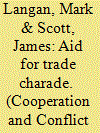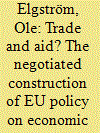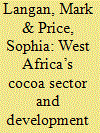|
|
|
Sort Order |
|
|
|
Items / Page
|
|
|
|
|
|
|
| Srl | Item |
| 1 |
ID:
132326


|
|
|
|
|
| Publication |
2014.
|
| Summary/Abstract |
Aid for Trade (AfT) has gained prominence as an innovative form of donor support in the 'post'-Washington Consensus. AfT mechanisms have been praised as a means of aligning trade liberalisation deals (whether in the Doha Round or within bilaterals) to poverty reduction objectives. This article, through critical analysis of AfT discourse within the 'moral economies' of multilateral World Trade Organization and bilateral European Union-African, Caribbean and Pacific negotiations, points to the strategic purposes of donor language in rationalising asymmetric North-South trade systems. Moreover, it questions the 'development' credentials of AfT assistance by examining some of the ensuing private sector activities and the impact on the supposed beneficiaries, and the tying of AfT disbursements to the implementation of inappropriate policies.
|
|
|
|
|
|
|
|
|
|
|
|
|
|
|
|
| 2 |
ID:
141894


|
|
|
|
|
| Summary/Abstract |
This article investigates the regional dynamics of African agency in the case of negotiations on an Economic Partnership Agreement (EPA) between the EU and a group of Southern African countries, known as SADC-Minus. I argue that these negotiations were shaped by a pattern of differentiated responses to the choice set on offer under the EPAs by SADC-Minus policy makers and by a series of strategic interactions and power plays between them. I offer two contributions to an emerging literature on the role of African agency in international politics. First, I argue for a clear separation between ontological claims about the structure–agency relationship and empirical questions about the preferences, strategies and influence of African actors. Second, I suggest that, in order to understand the regional dynamics of African agency, it is important to pay close attention to the diversity and contingency of African preferences and to the role of both power politics and rhetorical contestation in regional political processes.
|
|
|
|
|
|
|
|
|
|
|
|
|
|
|
|
| 3 |
ID:
088479


|
|
|
|
|
| Publication |
2009.
|
| Summary/Abstract |
Efforts by the European Commission and by leading member states, to normatively frame the debate about trade - and thus rhetorically entrap other actors by references to previous commitments - are ubiquitous; and member states do take account of the potential effects of their actions, in terms of potential praise or shaming, and adapt their behaviour to the institutional setting. However, this holds true only up to a certain limit. If sensitivity to domestic constituencies is high enough and the issue gets politicized, then member states may break ranks regardless of institutionalized normative constraints, especially if the issue-area is linked to proclaimed key self-images of the government. External pressure can also play its part. Indeed, the Commission's reluctant decision to include development sections in the final offer was arguably not only the result of internal member state activity, but also of pressure from the EU's counterpart - Africa, the Caribbean and the Pacific - whose main bargaining objective was to include strong and effective development provisions in the final agreement.
|
|
|
|
|
|
|
|
|
|
|
|
|
|
|
|
| 4 |
ID:
171245


|
|
|
|
|
| Summary/Abstract |
The EU is vigorously pursuing Economic Partnership Agreements (EPAs) in its trade and aid relations with African, Caribbean and Pacific (ACP) countries. Justifying the EPAs as being ‘development friendly’, EU officials promise that aid support to private sector development (PSD) in ACP countries will make free trade systems ‘win–win’. This article, based on the authors’ semi-structured interviews conducted in Ghana and Nigeria, examines the perspectives of cocoa stakeholders vis-à-vis EPAs and PSD. Applying critical discourse analysis to interview transcripts, it underscores areas of overlap and, crucially, divergence among cocoa stakeholders’ own narratives on PSD support in the context of EPAs and the official legitimating discourse of EU institutions. In the process, the article draws critical attention to cocoa business interviewees’ concerns regarding the impact of premature trade liberalisation. It also underscores cocoa stakeholders’ concerns that EU PSD promises are not being fulfilled in terms of actual tangible benefits for business people in this vital ACP export sector. Accordingly, the article contributes to, and corroborates, an existing critical scholarly literature which problematises the strategic functions of donor PSD discourse in presenting free trade reforms as being ‘pro-poor’ in the post-Washington Consensus.
|
|
|
|
|
|
|
|
|
|
|
|
|
|
|
|
|
|
|
|
|